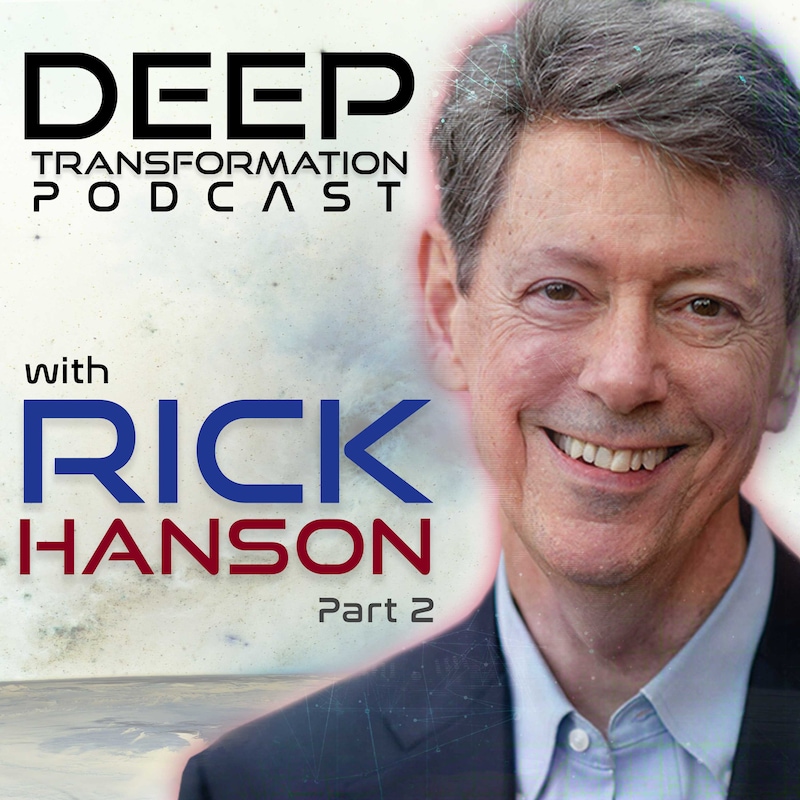Ep. 6 (Part 2 of 2) | In this inspiring and empowering conversation, Rick Hanson spells out how we can use positive, self-directed neuroplasticity to hardwire our brains in order to become happier, cultivate virtues, deal with cravings, become deeply grounded, turn our desired states into stable traits, and more. Neurodharma is Rick’s conceptual creation: a marriage of neuroscience, psychology, and contemporary wisdom that offers individuals who are out to make a change for the better an impressive and effective brain hacking toolkit. Rick’s own gentle wisdom, compassion, clarity, kindness, and humor shine in this truly groundbreaking (for most of us) dialogue, making him a wonderful exemplar of the peaceful, loving, altruistic, and effective person practicing neurodharma can help us to become. Recorded September 20, 2021.
Rick Hanson, Ph.D., is an expert on positive neuroplasticity, a clinical psychologist, a New York Times best-selling author, and a Senior Fellow of the Greater Good Science Center at UC Berkeley. His books include Neurodharma, Resilient, Hardwiring Happiness, Buddha’s Brain, Just One Thing, and Mother Nurture, and have been published in 30 languages. He has lectured at NASA, Google, Oxford, and Harvard, and taught in meditation centers worldwide. Rick's work has been featured on the BBC, CBS, NPR, and other major media. He began meditating in 1974 and is the founder of the Wellspring Institute for Neuroscience and Contemplative Wisdom. Rick loves wilderness and taking a break from emails.
“We need to actively work with the mind to pull weeds and plant flowers.”
Topics & Timestamps - Part 2
- 2 major obstructions to speeding our growth (01:04)
- Gradual cultivation, sudden awakening, gradual cultivation (06:08)
- Bodhidhamma: practice is like a wagon with 2 wheels (06:39)
- What are the crucial qualities of heart and mind that are essential to cultivate? (10:32)
- Who has lit the fire in Rick’s heart? (12:48)
- Truly wise person: Peaceable, friendly, fearless (15:31)
- The importance of trusting our own minds (19:09)
- What are Rick’s daily practices? (22:26)
- Paying attention to the subtleties of craving (23:55)
- Focusing on a sustained felt sense of the ground of all; recognizing the extraordinary generosity of the arising moment (27:40)
- How does Rick understand the act of transmission? 29:16
- Reverse engineering desired qualities to yourself (31:39)
- What are Rick’s priorities for the future? (35:21)
- Self-directed neuroplasticity: 3 foundational practices (36:59)
- Re-establishing the 3 enabling conditions of healthy human politics (38:09)
- Playfulness, to include curiosity, makes us receptive to lasting change (41:08)
Resources & References - Part 2
- Shunryu Suzuki-roshi, Zen monk and teacher who founded the first Zen Buddhist monastery outside of Asia
- Bodhidharma, Buddhist monk credited with bringing Buddhism to China
- Ram Dass, Life in Balance: A Path to Equanimity and Peace
- Joseph Goldstein, American mindfulness teacher
- Thich Nhat Han, Vietnamese monk, exemplar of embodied wisdom, peace activist
- Christina Feldman, Boundless Heart*
- Tara Brach, Trusting the Gold*
- Carl Rogers, pioneering humanist psychologist
- Rick Hanson, author of Neurodharma, Resilient, Hardwiring Happiness, Buddha’s Brain, Just One Thing, and Mother Nurture*
- Founder of the Wellspring Institute for Neuroscience and Contemplative Wisdom, whose mission is to offer skillful means for changing the brain to benefit the whole person and all beings in a world too full of war.
* As an Amazon Associate, Deep Transformation earns from qualifying purchases.
Podcast produced by Vanessa Santos
Show Notes by Heidi Mitchell





